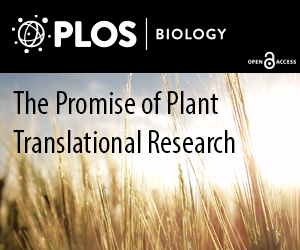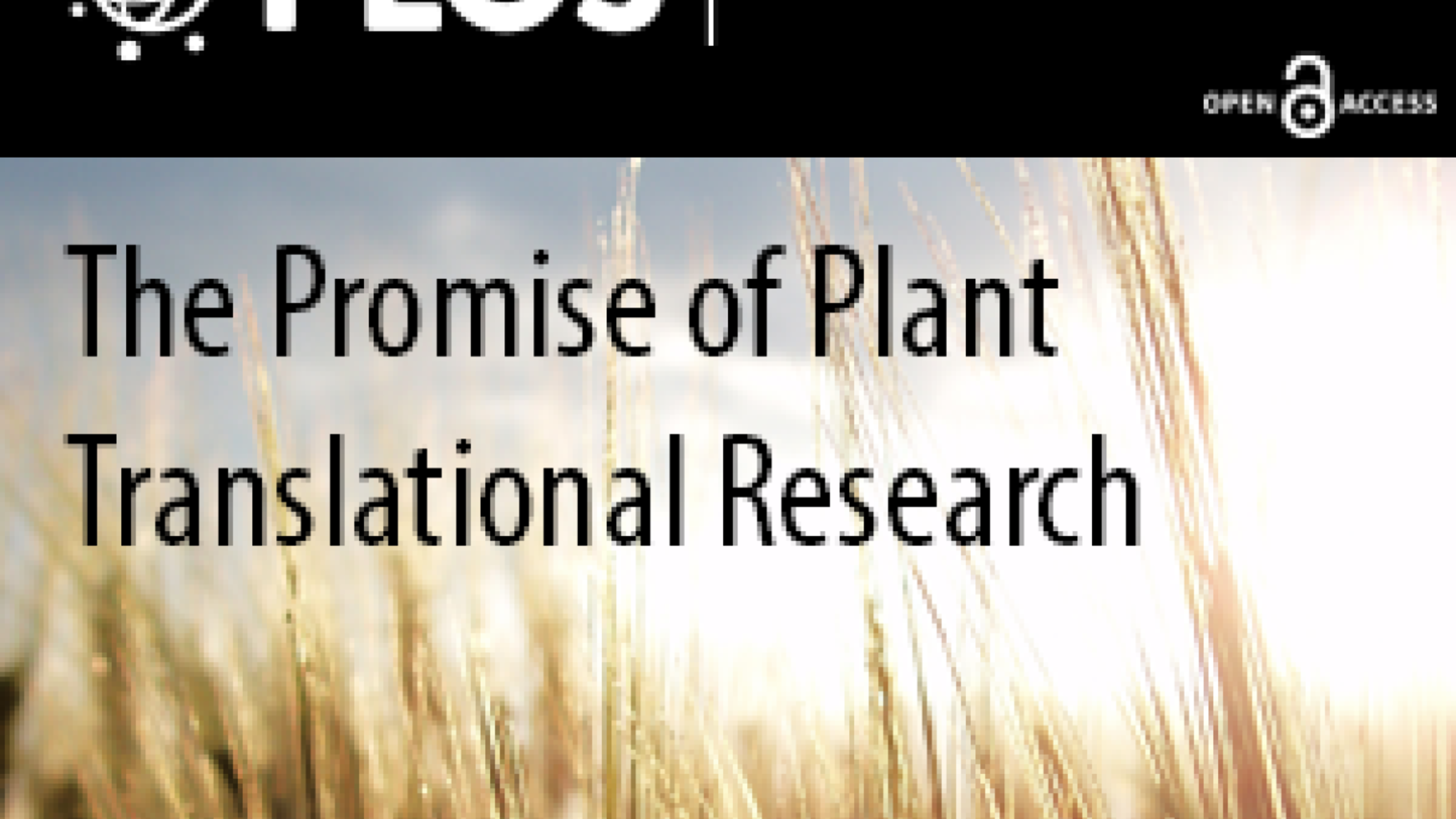Starch, Oil, Water and Arsenic: New Plant Translational Research
by Christina Kary

PLOS launched a Collection last year, “The Promise of Plant Translational Research”. Here’s an update on how it’s going, and where we hope to go from here.
In my former life as ‘Plantina’ (I can thank my friends for that one), I worked on a small cut-flower farm in Maryland before heading off to grad school. These days, when I’m not in front of a computer screen, you’re still likely to catch me with my fingers in the dirt, potting this or that, or tending to my little patch of green in San Francisco. So I couldn’t be more delighted to highlight the new advances we’ve added to this Collection—and encourage you to submit your plant research discoveries to PLOS Biology as we continue to expand upon it.
In the face of increasing competition for land and water resources, feeding our ever expanding population will require breakthroughs to improve agriculture in ways that are safe, sustainable, and environmentally sound. PLOS is committed to supporting plant translational research – the development of basic plant research findings into new tools to improve crops. As you’ll see, the new papers we’ve added to our Collection exemplify how basic research is leading to exciting innovations in plant technology. These discoveries have the potential to touch our everyday lives in a myriad of ways—from improving food safety by limiting toxins in crops, to helping plants adapt to climate change, influencing household products, and finding better ways to produce biofuels.
Today we’re publishing a brand new addition to our Collection. Our diets depend upon staple foods that contain starch—a carbohydrate that plants make to store energy—including rice, wheat, corn, potatoes and cassava. Starch is not only a major food component; it’s also used to produce pharmaceuticals and paper. Indeed, civilizations were built upon the development of starch crops. Yet we still don’t fully understand how plants make starch. In the paper we’ve just published, Samuel Zeeman and colleagues characterize a factor that is involved in synthesizing starch components. This discovery points to a new gene to target for biotechnology to modify starch, with the potential to influence our diets as well as household items.
Generating Barrels of Seed Oil
Another addition to our Collection just added earlier this month also presents powerful tools to improve plant products that we rely on each day but often overlook. All plants contain oils in their seeds that are used in everything from cooking oils (sunflower oil makes me smile) to oils used in soap, cosmetics, and even paint. Nannan Li and co-workers recently isolated a new protein that is found in the membranes of plant chloroplasts—the biochemical machines in plant cells that convert the sun’s energy into fuel. They show that this protein transports fatty acids, the building blocks for plant oils, across chloroplast membranes. This knowledge could be applied to increase oil and biofuel production in plants. Further, because structural relatives of this factor exist in all vertebrate mitochondria—the powerhouses of our cells—this study opens up possibilities for the development of new transport systems, even in animals, that could impact our lives in unexpected ways.
A study from our Collection that published in September 2014 may lead to new strategies to help crops adapt to low oxygen availability. But why is this important? Plants experience sub-optimal oxygen conditions during events such as floods—flooding causes root hypoxia. This is a key problem that must be solved if our crops are to adapt to global warming, given the likelihood of increased flooding as our climate changes. It turns out that only a few of the molecular components that allow plants to adapt to fluctuating oxygen levels are known. Research carried out by Beatrice Giuntoli and co-authors uncovered a mechanism that regulates how plants sense oxygen, identifying a factor that allows plants to modulate the response to hypoxia. This work presents new opportunities for breeding crops that can resist floods—traits that may prove key to food security as plants adapt to environmental change.
Keeping Arsenic off Our Plates

The final paper I’ll highlight here, published in December 2014, is one that I find particularly compelling. Much of the world’s groundwater contains arsenic, a toxin that has been linked to cancer and heart disease. Arsenic accumulates in irrigated crops, and its ingestion through foods presents a serious risk to human health. Because rice absorbs arsenic more readily than other grains, this problem disproportionately affects people in countries where rice is a staple and the water is contaminated. While we know that plants eliminate arsenic, we don’t know how they accomplish this. In their study, Dai-Yin Chao and collaborators identify a new gene that plants require to reduce arsenic accumulation. This work provides an important new resource for the development of foods with low arsenic levels—with the potential to improve food safety for untold numbers of people.
PLOS launched this Collection because we believe that discoveries with translational potential should be published in Open Access journals. We aim to spur discussion about the need for translational research and communicate the findings to the widest possible audience.
But how can we encourage public discourse about promising advances in plant translational research? Going back to the garden now, my thoughts drift to summer trips home to Michigan or Maine. When visiting family, it seems I always end up spending time face-down, pulling weeds. Thinking of the name on my dad’s barn in Maine—Grand View Farm—it strikes me that we’re all going to need to expand our ideas about how agriculture can be transformed to accommodate our increasingly demanding world.
So where do we go from here? Check out the fantastic new additions that we’ve just published in PLOS Biology. Spread the word about translational research by sharing your favorites. Help us build this Collection by submitting your discoveries to one of our journals (PLOS Biology, PLOS Pathogens, PLOS Genetics, PLOS Computational Biology and PLOS ONE are the most relevant), so that to that those who would most benefit can access your findings without barriers.
We’d like to thank all of the researchers who have submitted their work in response to our call for papers. We’re grateful to our advisory Academic Editors for their advice on this Collection: Jeffrey Dangl, Sophien Kamoun, and Susan McCouch. We also thank the Bill and Melinda Gates Foundation for supporting the Collection.
New articles in PLOS Biology published as part of “The Promise of Plant Translational Research”:
PROTEIN TARGETING TO STARCH is Required for Localising GRANULE-BOUND STARCH SYNTHASE to Starch Granules and for Normal Amylose Synthesis in Arabidopsis by David Seung, Samuel C. Zeeman and colleagues.
FAX1, a Novel Membrane Protein Mediating Plastid Fatty Acid Export by Nannan Li, Katrin Philippar and colleagues.
A Trihelix DNA Binding Protein Counterbalances Hypoxia-Responsive Transcriptional Activation in Arabidopsis by Beatrice Giuntoli, Pierdomenico Perata and colleagues.
Genome-wide Association Mapping Identifies a New Arsenate Reductase Enzyme Critical for Limiting Arsenic Accumulation in Plants by Dai-Yin Caho, David E. Salt and colleagues.
Christina Kary is an Associate Editor at PLOS Biology.

